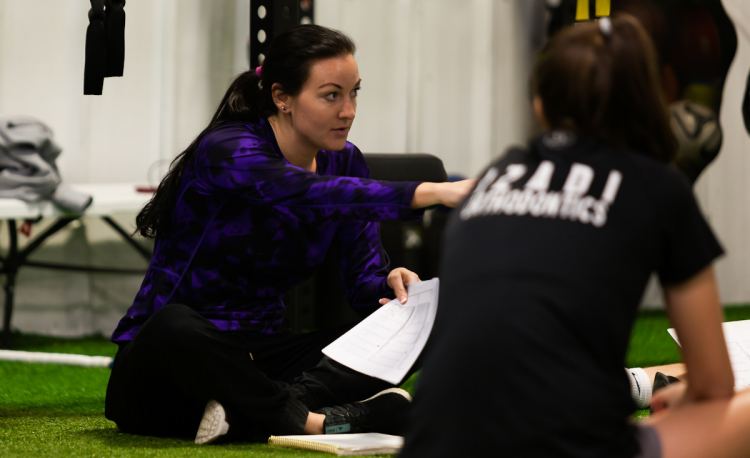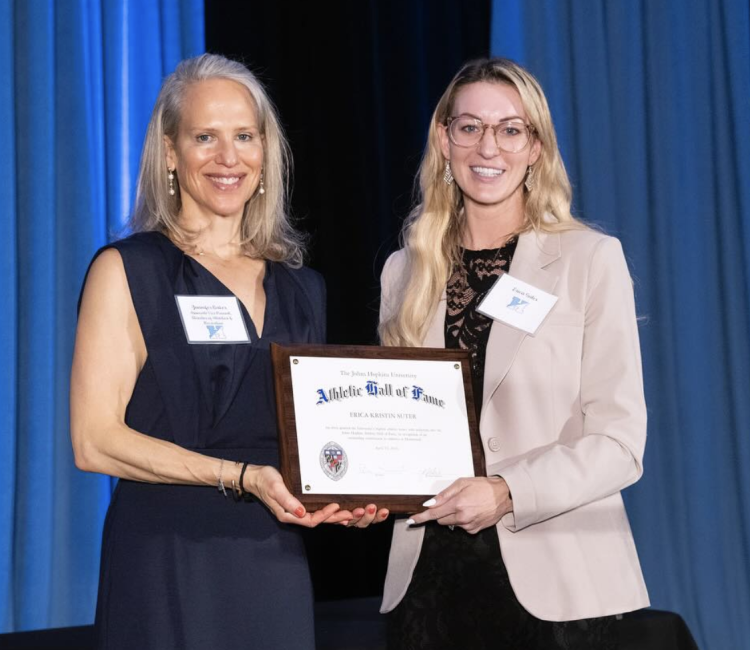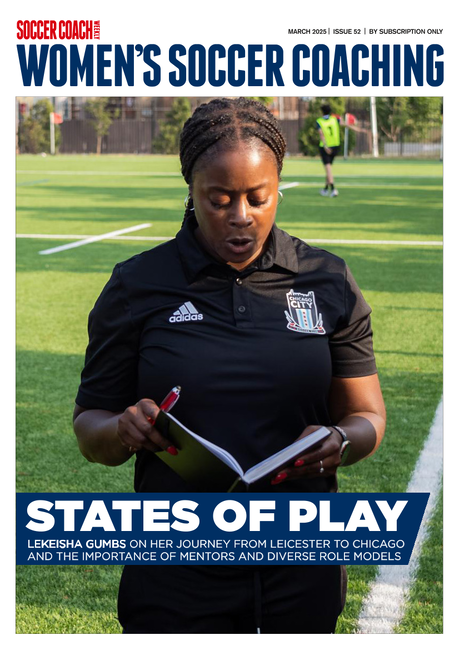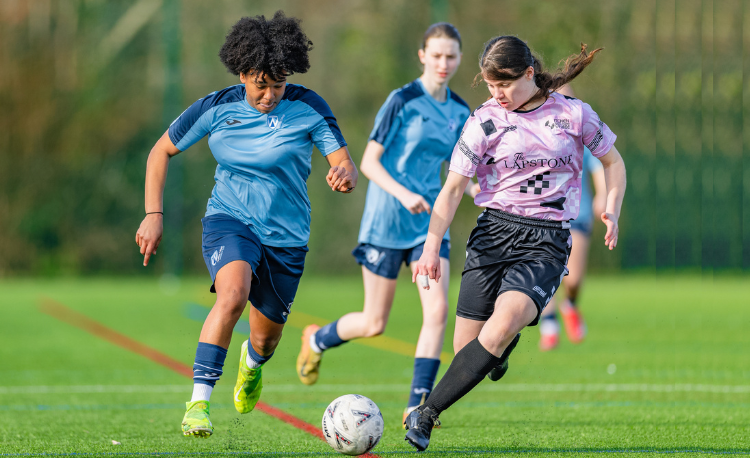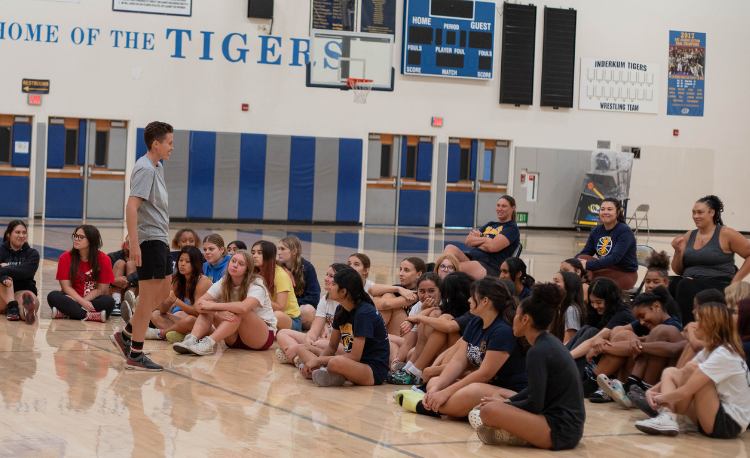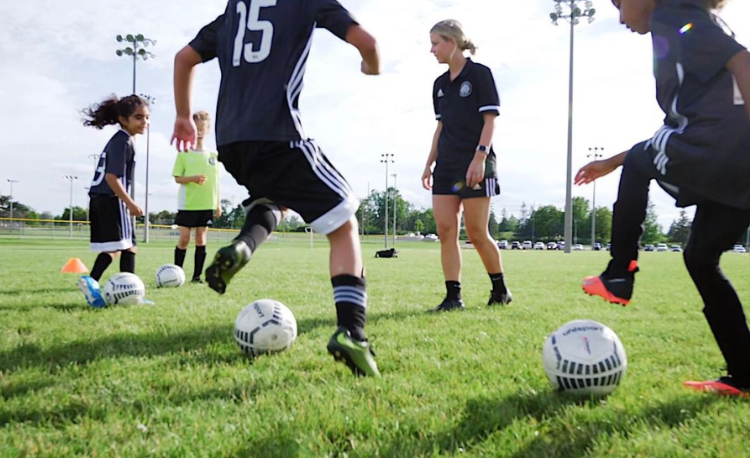You are viewing
2 of your 3 free articles
Erica Suter Mulholland: Managing menopause and perimenopause
Experiencing menopause and perimenopause symptoms is not ‘just a part of life’ – there are ways you can manage them. Performance specialist and S&C coach Erica Suter Mulholland explains how to Carrie Dunn.
Menopause is a subject rarely discussed in general, let alone in soccer circles – so it is just as well that this important aspect of women’s health has Erica Suter Mulholland as an energetic advocate.
Erica started playing soccer when she was six years old – and, although it started as a hobby, it has gone on to shape her whole life.
She started taking the game more seriously as a teenager, and decided to take the collegiate route and play soccer during her tertiary education.
During her time at Johns Hopkins University, she racked up the honours: named an NSCAA All-American, as well as the university’s outstanding female athlete, and scoring so many goals that she still stands at number two in their rankings.
Erica used that as a springboard to play semi-professionally, which she did for a year at Vasco da Gama.
While in Brazil, she also coached children, and that was where she began to think about the optimum training and preparation for female athletes of all ages: strength training, injury reduction and empowerment.
These were things that she recognised would not only be useful to those playing at a high level, to ensure peak performance, but also to overall health and everyday life.
Soccer might be the same sport around the world, but, as the women’s game has become increasingly popular, globally, and more countries have professional leagues, the ways in which it needs adapting from the men’s game to suit female physiology have become increasingly evident.
“More needs to be done on loading and periodisation around the menstrual cycle...”
“There are so many factors to consider,” Erica tells WSC, “especially with the hormonal discussion, and things we should be educating female athletes on, in terms of proper nutrition to support hormones, and making sure our energy is great to perform.”
Load management is also key, Erica notes. “The practice and game schedule from youth to pro level is pretty insane now, and [we need to] understand how the body responds to that much load and how to make sure our girls are recovering quickly.”
Ensuring that strength and conditioning programs are tailored for female athletes is an important part of a coach’s role.
“A lot of female players could use a lot of single-leg strength, hamstring and glutes strengthening, even upper body. Don’t let them shy away from those things,” she says.
“I think this is where the next research is going to happen in the women’s space. At this point, we understand that strengthening the female body helps with injury reduction, but more needs to be done on loading, and maybe periodisation around the menstrual cycle, if there’s ways to actually implement that in a practical setting.”
The uniquely female physical challenge of the menstrual cycle leads into the challenges of perimenopause and menopause.
Perimenopause usually happens between the ages of 40 and 44, and is the time when there is a gradual decline in the functioning of the ovaries and an overall decline in total oestrogen in the body, leading to more irregular periods.
Menopause follows, usually between the ages of 45 and 55, and is defined as when periods have stopped for 12 months.
And Erica is glad that there are finally discussions around both, after years of being treated as taboo – even sometimes by the medical profession.
“[Women] will go to their doctor to complain about their symptoms, and a lot are just brushed off and the doctor doesn’t give them any solutions.
“They leave that appointment with more questions than they have answers.”
A lot of women will experience symptoms that affect their everyday lives – Erica says it’s around 85%.
Such a big number having problems suggests that they have not been given enough preparation for this time in their life, and simply don’t know what to expect.
“Usually in perimenopause, since the oestrogen is so erratic, there’s the hot flashes, mood swings and the spikes and dips in energy,” explains Erica.
“There’s also a loss of muscle mass – they might be starting to gain fat mass, or holding on to more water and not feeling as strong.
“During menopause, some women [experience] anxiety and depression, very mentally crippling symptoms.
“A lot talk about thinning in the hair, especially around the scalp area, and weight gain as well, due to the dip in oestrogen and insulin resistance becoming a problem, and not being able to regulate blood sugar levels.
“[There can be] also a loss of bone density, so feeling a little bit weaker or more fatigued than normal. Insomnia is a big one, too, usually because of the blood-sugar dysregulation; having those spikes and dips does not help with the sleep cycle.
“There’s a whole range of symptoms. Some women experience some, others experience almost all of them, but there are definitely ways to mitigate them, [if not] get rid of them altogether.”
Being able to do this, for some of the more debilitating effects, is crucial for a coach who is experiencing them.
“They have to be ‘on’. They have to be focused for their sessions,” says Erica.
“They have to bring the energy, especially the women at the very highest levels – [but] even at the youth levels, you have to always be motivating and inspiring your athletes.”
Erica says the first thing to consider is nutrition. Eating the right foods will help with fatigue and avoid under-fuelling.
“They cannot be yo-yo dieting or restricting calories, because, then, they’re not going to have the energy at all. That’s going to disrupt their sleep and it becomes this cycle that’s really hard to get out of,” she says.
The right nutrition will also help with blood-sugar regulation, which Erica thinks is an under-reported issue; increased insulin resistance means cutting out things like ultra-processed foods or sugary treats might be necessary in order to ensure steady blood-sugar levels and a decent night’s sleep.
For someone who has spent their whole life in sport, though, changing diet might be something they struggle with.
They might be used to fuelling their body in one way, for high performance – but now they have additional considerations. Not only that, but they may also need to adjust the exercise they are doing.
ERICA’S LIST OF go-to MENOPAUSE and women’s health EXPERTS
It can be difficult to find the right kind of information about specialist health topics.
So, to find out more about perimenopause, menopause and women’s health more broadly, Erica recommends checking out the work of Dr. Jaime L. Seeman; Dr Elizabeth Bright, author of Good Fat is Good for Women: Menopause; Molly Galbraith, of Girls Gone Strong, a global women’s empowerment organisation; and CC Edmonds, and her book, Mastering Menopause.
Specific to soccer, she highlights the work of Dawn Scott, the former US women’s national team performance director, who WSC interviewed in our February 2021 issue.
“There are some [experts] out there,” Erica said, “But I would like to see more providing women with the nutrition training and lifestyle changes. It is something we need to start educating our female coaches and younger women on.”
AVOCADOS, FISH AND OTHER HEALTHY FATS – ERICA’S BRIEF GUIDE TO A NUTRITIONAL PLAN TO FIGHT AGAINST MENOPAUSAL SYMPTOMS
Erica recommends a nutritional plan that focuses on protein, as well as the right kind of fats.
“Certain fats are really nourishing for the brain, like avocados and fish – all the healthy fats, with Omega 3, are really good for mental health,” she says.
“Our brain is made up of over 60% fat, so it makes a lot of sense to feed it with fat, but it has to be those Omega 3-rich, usually single-ingredient, fats.
“Also, our steroid hormones are made out of fat; they’re made up of cholesterol. So, again, the healthy fats are going to help with that oestrogen decline.”
Healthy fats also help with vitamins for bone health and strength, so these dietary tweaks can have a real impact for many women experiencing perimenopausal or menopausal symptoms.
“They’re going to find that they feel a lot more satisfied,” Erica added.
“That’s also going to help with the muscle mass loss during this time, and it’s going to make sure that their mood is more stable – having high protein really helps with the mental health issues, as well.”
Related Files
“You don’t want to increase the cortisol response in the body [through exercise], so women have to be a lot smarter with not killing themselves in the gym or punishing themselves because they want a certain body type,” says Erica.
“They should really be focusing on strength training during this time, to build that muscle mass and just to get a good bang-for-their-buck out of those workouts. They don’t need to work out for two hours jogging or [doing] anything endurance.
“The strength training is going to be really key for them during this time.”
But these kinds of adjustments can genuinely make a huge difference as women move into a new phase of life.
“It’s definitely a tough transition,” Erica acknowledges. “Some women see changes within the first few months. That doesn’t mean they have to overhaul everything.
“They can start with just not exercising as much or maybe adding a little bit more protein and eating that first in their meal, see what happens. [It’s about] getting into good habits – maybe you’re hydrating a little bit more and getting electrolytes, so you don’t get fatigued.
“Start small, and think: ‘OK, how bad are these symptoms crippling my life, my relationships and my ability to coach and inspire other women? Is it worth it for me to mitigate these symptoms, and really take action and make changes in my life?’”
This applies to girls and women playing recreational soccer, as well at the elite end of the soccer spectrum.
Older women are continuing their playing careers longer at this level, and some are coming to it fresh through walking football.
“Women should focus on strength training during this time to build muscle mass...”
Erica says that staying active is brilliant but the physical demands of the game still need to be remembered, even at a fun, leisurely level.
“You’re still covering a lot of miles, running a lot of sprints, and making a lot of changes of direction, which can wear on the bones during a very precarious time for women, so that’s why the strength training is still key,” she explains.
“Activity will help strengthen the bones, but we also need to load the bones with more of a challenge in the gym: adding resistance, progressing over time, still upping the dumbbells every few weeks, or each month.
“And I’d argue that, during this age, you almost have to challenge yourself a little bit more with the strength than when you were younger, because that bone density is really going fast and the muscle mass is going back.
“I don’t want older women to shy away from lifting heavy – they should, but progress it gradually. Maybe work with a coach who can make sure you’ve got good form.”
Erica urges any woman experiencing perimenopausal or menopausal symptoms to get expert advice, whether that is medical, dietary, nutritional or athlete performance, and emphasises that there are ways to help some of the symptoms.
“When women age, everyone’s, like, ‘Oh, their ovaries are done’ and all these ridiculous things,” she says.
“If your doctor tries to ignore your symptoms, or just says, ‘This is just a part of life, it is what it is,’ then that’s a red flag, for me.
“You can reverse this – you don’t have to deal with all these symptoms and they don’t need to be this amplified.”
Newsletter Sign Up
Newsletter Sign Up
Discover the simple way to become a more effective, more successful soccer coach
In a recent survey 89% of subscribers said Women's Soccer Coaching makes them more confident, 91% said Women's Soccer Coaching makes them a more effective coach and 93% said Women's Soccer Coaching makes them more inspired.
*includes 3 coaching manuals
Get Inspired
All the latest techniques and approaches
Women's Soccer Coaching offers proven and easy to use soccer drills, coaching sessions, practice plans, small-sided games, warm-ups, training tips and advice.
We've been at the cutting edge of soccer coaching since we launched Soccer Coach Weekly in 2007, creating resources for the grassroots youth coach, following best practice from around the world and insights from the professional game.
